1 Samuel 16 meaning explained in AI Summary
This chapter marks a turning point in the book of Samuel. Here, God rejects Saul as king and secretly anoints David as the future king of Israel.
1. God's Instructions to Samuel (1-13): God, grieved by Saul's disobedience, instructs Samuel to go to Bethlehem and anoint a new king from the house of Jesse. Samuel is hesitant, fearing Saul's reaction, but God provides a plan - Samuel will say he's there to offer a sacrifice.
2. Meeting Jesse and his Sons (14-23): Samuel arrives in Bethlehem and is impressed by Jesse's eldest son, Eliab. However, God reminds Samuel that He looks at the heart, not outward appearances. One by one, seven of Jesse's sons pass before Samuel, but God rejects each of them.
3. David, the Chosen One (1-13): Samuel asks if Jesse has any other sons. Jesse calls for David, the youngest, who is tending sheep. David, described as having a handsome appearance and noble character, is chosen by God. Samuel anoints David with oil, signifying God's choice and the descent of the Holy Spirit upon him.
Key Themes:
- God's Sovereignty: God demonstrates His absolute authority by rejecting Saul and choosing David, even though David is young and seemingly insignificant.
- Outward Appearance vs. the Heart: God's focus on the heart over outward appearances is emphasized. Eliab, impressive in stature, is rejected, while David, the humble shepherd, is chosen.
- The Anointing of the Spirit: David's anointing signifies the transfer of power and authority. It marks the beginning of his journey as the future king of Israel.
Significance:
This chapter sets the stage for the rest of David's story. It establishes God's hand on David's life and foreshadows the eventual transition of power from Saul to David. It also highlights the importance of humility and obedience in God's eyes.
1 Samuel 16 bible study ai commentary
1 Samuel 16 contrasts God's eternal perspective with flawed human judgment. As Samuel, the prophet, mourns the rejection of King Saul, God directs him to anoint a new king from the sons of Jesse in Bethlehem. Man looks at the outward appearance—strength, stature, and experience—but the LORD looks at the heart. This principle leads to the anointing of David, the youngest son and a shepherd, who is immediately empowered by the Spirit of the LORD. In a dramatic turn of divine irony, the same Spirit departs from Saul, who is then tormented and unknowingly summons his anointed successor, David, to soothe him with music.
1 Samuel 16 context
Following King Saul's definitive rejection by God for disobedience (1 Samuel 15), the nation of Israel is in a state of political and spiritual crisis. Saul, chosen for his outward appearance (1 Sam 9:2), has proven to be a failure in his heart's devotion to God. This chapter marks the pivotal transition point. The narrative shifts from the failing king to God's secret, sovereign choice of a new one. The act of a prophet anointing a king was a powerful declaration that kingship in Israel was not a matter of human succession or power, but a divine appointment. The choice being a humble shepherd from Bethlehem, rather than a military commander or nobleman, underscores a radical redefinition of leadership.
1 Samuel 16:1
The LORD said to Samuel, “How long will you grieve over Saul, since I have rejected him from being king over Israel? Fill your horn with oil, and go. I will send you to Jesse the Bethlehemite, for I have provided for myself a king among his sons.”
In-depth-analysis
- God's command is both a rebuke and a commissioning. He pushes Samuel beyond his grief for Saul, which, while understandable, opposes God's sovereign decision.
- "Horn with oil": A significant detail. A qeren (קֶרֶן), or animal horn, symbolized strength and authority. This contrasts with the "flask" of oil used for Saul's more private anointing (1 Sam 10:1), suggesting David's anointing is more substantial and his kingdom more enduring.
- "I have provided for myself a king": The Hebrew ra'iti li (רָאִיתִי לִי), literally "I have seen for myself a king." This emphasizes God's active, personal, and sovereign selection, independent of human or prophetic input. It sets the theme for the rest of the chapter.
Bible references
- 1 Samuel 15:23: "Because you have rejected the word of the LORD, he has also rejected you from being king." (Direct cause for this chapter's events).
- Hosea 13:11: "I gave you a king in my anger, and I took him away in my wrath." (God's sovereignty over Saul's rise and fall).
- Acts 13:22: "And when he had removed him, he raised up David to be their king, of whom he testified and said, ‘I have found in David the son of Jesse a man after my own heart...’" (NT summary of this event).
Cross references
Psa 89:20 (Finding and anointing David); 1 Sam 13:14 (The promise of a man after God's heart); 1 Kgs 1:39 (Solomon also anointed from a horn).
1 Samuel 16:2-3
And Samuel said, “How can I go? If Saul hears it, he will kill me.” And the LORD said, “Take a heifer with you and say, ‘I have come to sacrifice to the LORD.’ And invite Jesse to the sacrifice, and I will show you what you shall do. And you shall anoint for me him whom I declare to you.”
In-depth-analysis
- Samuel's fear is legitimate. Saul is paranoid, volatile, and has already demonstrated a willingness to kill his own son (1 Sam 14:44). A prophet anointing a rival king would be seen as treason.
- God provides a practical solution, not a rebuke for Samuel's fear. The sacrifice is a legitimate reason for a prophet to travel, providing a cover for the true mission. This shows God's condescension to human weakness and his strategic wisdom.
- The instructions highlight Samuel's complete dependence on God. He is told to go, but the identity of the chosen one will only be revealed after he arrives. This is a test of faith for the prophet.
Bible references
- 1 Samuel 18:10-11: "Saul sought to pin David to the wall with the spear, but he eluded Saul..." (Confirms Saul's murderous paranoia).
- Exodus 3:18: "And they will listen to your voice, and you and the elders of Israel shall go to the king of Egypt and say to him, ‘The LORD... has met with us; and now, please let us go a three days' journey into the wilderness, that we may sacrifice...’" (God providing a plausible reason for a divine mission).
Cross references
1 Sam 20:1-3 (Jonathan confirms Saul wants to kill David); Gen 27:6-10 (Jacob using deception for a blessing, a human counter-example); Prov 21:1 (The king's heart is a stream of water in the hand of the Lord).
1 Samuel 16:4-5
Samuel did what the LORD commanded and came to Bethlehem. The elders of the city came to meet him trembling and said, “Do you come peaceably?” And he said, “Peaceably; I have come to sacrifice to the LORD. Consecrate yourselves, and come with me to the sacrifice.” And he consecrated Jesse and his sons and invited them to the sacrifice.
In-depth-analysis
- "came to meet him trembling": The unannounced arrival of a major prophet often signaled divine judgment. They fear he has come to pronounce a curse or declare punishment on their city.
- "Consecrate yourselves": This involved ritual washing and changing clothes, signifying purification in preparation for a sacred event. It underscores the holiness of what is about to transpire. The true king must come from a sanctified setting.
Bible references
- 1 Kings 17:18: "And she said to Elijah, ‘What have you against me, O man of God? You have come to me to bring my iniquity to remembrance and to cause the death of my son!’" (Example of fear at a prophet's arrival).
- Exodus 19:10-11: "And the LORD said to Moses, 'Go to the people and consecrate them today and tomorrow, and let them wash their garments...'" (Preparation for meeting with God at Sinai).
Cross references
Num 11:18 (Consecration for receiving meat); Josh 3:5 (Consecration before crossing the Jordan); 1 Chr 15:12 (David commands Levites to consecrate themselves).
1 Samuel 16:6-7
When they came, he looked on Eliab and thought, “Surely the LORD's anointed is before him.” But the LORD said to Samuel, “Do not look on his appearance or on the height of his stature, because I have rejected him. For the LORD sees not as man sees: man looks on the outward appearance, but the LORD looks on the heart.”
In-depth-analysis
- Samuel, the great prophet, immediately makes the same mistake the nation made with Saul. Eliab was tall and physically impressive, fitting the conventional model of a king.
- Verse 7 is the theological cornerstone of the entire Old Testament narrative of kingship and leadership.
- "The LORD sees not as man sees": A direct polemic against worldly standards of value. God's criteria are internal, not external.
- "Outward appearance": Hebrew `ayin (עַ֫יִן), the eye. What is visible to the human eye.
- "The heart": Hebrew levav (לֵבָב). This refers to the inner self—the seat of intellect, emotion, will, and character. God's evaluation penetrates to the very core of a person.
- God has "rejected" (ma'as) Eliab even before Samuel can nominate him, using the same powerful verb used for Saul's rejection.
Bible references
- John 7:24: "Do not judge by appearances, but judge with right judgment." (Jesus echoes this principle).
- Jeremiah 17:10: "I the LORD search the heart and test the mind, to give every man according to his ways..." (God's unique ability to judge the inner person).
- 2 Corinthians 10:7: "You are looking at things as they are outwardly. If anyone is confident that he is Christ’s, let him remind himself that as he is Christ’s, so also are we." (Paul applies the same logic against his opponents).
Cross references
1 Sam 9:2 (Saul's impressive height); Psa 147:10-11 (God delights not in strength but in fear of Him); 1 Pet 3:3-4 (True beauty is a gentle and quiet spirit).
1 Samuel 16:8-11
Then Jesse called Abinadab and made him pass before Samuel. And he said, “Neither has the LORD chosen this one.” Then Jesse made Shammah pass by. And he said, “Neither has the LORD chosen this one.” And Jesse made seven of his sons pass before Samuel. And Samuel said to Jesse, “The LORD has not chosen these.” Then Samuel said to Jesse, “Are all your young men here?” And he said, “There remains yet the youngest, but behold, he is keeping the sheep.” And Samuel said to Jesse, “Send and get him, for we will not sit down till he comes here.”
In-depth-analysis
- The repetitive rejection of seven sons creates dramatic tension and emphasizes God's precision. Seven is a number of biblical completeness; Jesse presents a "complete" set of sons, but all are found wanting.
- "There remains yet the youngest": David is an afterthought. He is so insignificant in his father's eyes that he wasn't even called to the sacred feast and anointing ceremony. This highlights his humility and lowly status.
- "He is keeping the sheep": This introduces the shepherd motif, a vital biblical metaphor for leadership (Psa 23, Ezk 34). A good shepherd cares for, protects, and guides his flock—precisely the qualities needed in a king for God's people.
- "We will not sit down": The anointing feast cannot begin without God's chosen one. The entire affair is held in suspense, waiting for the one whom man forgot but God remembered.
Bible references
- Psalm 78:70-71: "He chose David his servant and took him from the sheepfolds; from following the ewes that had young he brought him to shepherd Jacob his people..." (A direct poetic summary of this event).
- 1 Corinthians 1:27-28: "But God chose what is foolish in the world to shame the wise; God chose what is weak in the world to shame the strong..." (The principle of God choosing the unlikely).
- Luke 15:4-7: The Parable of the Lost Sheep (Jesus as the good shepherd who seeks the one).
Cross references
Mic 5:2 (Bethlehem, small among clans, produces the ruler); Lk 2:8 (Shepherds are the first to hear of the birth of the ultimate king).
1 Samuel 16:12-13
And he sent and brought him in. Now he was ruddy and had beautiful eyes and was handsome in appearance. And the LORD said, “Arise, anoint him, for this is he.” Then Samuel took the horn of oil and anointed him in the midst of his brothers. And the Spirit of the LORD rushed upon David from that day forward. And Samuel rose up and went to Ramah.
In-depth-analysis
- "ruddy... beautiful eyes... handsome": The irony is that after God's lecture on not looking at appearance, His chosen one is described as handsome. The point is not that God prefers ugliness, but that appearance is not the qualifying factor. The beauty is a gift, not the reason for the choice.
- "Arise, anoint him, for this is he": The divine confirmation is direct and decisive. All doubt is removed.
- "anointed him in the midst of his brothers": A public act within the family. It establishes David's new status over his older siblings who had just been rejected. This would have been a source of both honor and future family conflict.
- "Spirit of the LORD rushed upon David": The Hebrew tsalach (צָלַח) implies a powerful, dynamic empowerment. This is not a mere influence but a permanent indwelling for the task of kingship. It is the spiritual enthronement that precedes his political one.
Bible references
- Numbers 11:25: "Then the LORD came down in the cloud... and took some of the Spirit that was on him and put it on the seventy elders. And as soon as the Spirit rested on them, they prophesied." (Example of the Spirit's empowerment).
- Judges 14:6: "Then the Spirit of the LORD rushed upon him [Samson], and although he had nothing in his hand, he tore the lion in pieces..." (The same powerful empowerment for a different task).
- Isaiah 61:1: "The Spirit of the Lord GOD is upon me, because the LORD has anointed me..." (Prophecy of the Messiah's anointing by the Spirit, fulfilled by Jesus).
Cross references
Acts 2:1-4 (The Spirit coming upon the apostles at Pentecost); Lk 4:18 (Jesus claims the anointing of the Spirit); 2 Sam 23:2 (David attributes his words to the Spirit).
1 Samuel 16:14-17
Now the Spirit of the LORD departed from Saul, and a harmful spirit from the LORD tormented him. And Saul’s servants said to him, “Behold now, a harmful spirit from God is tormenting you. Let our lord command your servants who are before you to seek out a man who is skillful in playing the lyre, and when the harmful spirit from God is upon you, he will play it, and you will be well.” So Saul said to his servants, “Provide for me a man who can play well and bring him to me.”
In-depth-analysis
- "Spirit of the LORD departed from Saul": A terrifying statement. The divine enabling for his office is removed. Saul is left spiritually hollowed out, a mere shell of a king.
- "a harmful spirit from the LORD": The Hebrew is ruach-ra'ah me'et YHWH. This is not a dualistic concept of an evil power equal to God. Rather, in the Old Testament's monotheistic framework, all things are under God's sovereignty. This "harmful" or "distressing" spirit is an instrument of divine judgment that God sends or allows to afflict Saul for his rebellion. It manifests as severe depression, paranoia, and rage.
- The servants recognize the malady as supernatural ("from God") and propose a remedy: music therapy. In the ancient world, music was believed to have power to influence the spiritual and emotional realms.
Bible references
- Judges 16:20: "And she said, 'The Philistines are upon you, Samson!' And he awoke from his sleep and said, 'I will go out as at other times and shake myself free.' But he did not know that the LORD had left him." (Samson's similar abandonment by the Spirit).
- Judges 9:23: "And God sent a harmful spirit between Abimelech and the leaders of Shechem..." (A direct parallel of God using a spirit to bring about judgment).
Cross references
1 Kgs 22:22-23 (The LORD putting a lying spirit in the mouths of prophets); Psa 51:11 (David's later plea, "Take not your Holy Spirit from me").
Polemics: The concept of a "harmful spirit from the LORD" is polemically aimed against dualism (the idea of two opposing, co-eternal gods, one good and one evil). The Israelite worldview insisted that YHWH is sovereign over all forces, including those that bring distress, using them to enact His judicial purposes. Modern readers may struggle with this, but it asserts God's ultimate control over all reality.
1 Samuel 16:18-23
One of the young men answered, “Behold, I have seen a son of Jesse the Bethlehemite, who is skillful in playing, a man of valor, a man of war, prudent in speech, and a man of good presence, and the LORD is with him.”...And David came to Saul and entered his service... And Saul loved him greatly, and he became his armor-bearer. ...And whenever the spirit from God was upon Saul, David would take the lyre and play. So Saul was refreshed and was well, and the harmful spirit departed from him.
In-depth-analysis
- The servant's description of David (v. 18) is a remarkable five-fold testimony to his character before he is publicly known: skilled artist, valiant warrior, wise speaker, handsome, and spiritually blessed ("the LORD is with him"). This shows that God's choice in v. 7 was based on a real, observable character that David had cultivated.
- "he became his armor-bearer": A position of utmost trust and proximity to the king. In a breathtaking act of divine irony and providence, God places his newly anointed king in the service of the rejected king. David is given a "backstage pass" to the royal court to learn about kingship and warfare.
- "David would... play... So Saul was refreshed": David's God-given gift is used to bring temporary relief to the man whose spiritual emptiness created the vacuum David was anointed to fill. It establishes a complex and fraught relationship between the two central figures of the book. David serves his enemy.
Bible references
- Genesis 39:2-3: "The LORD was with Joseph, and he became a successful man... His master saw that the LORD was with him and that the LORD caused all that he did to succeed." (The "LORD is with him" as a marker of divine favor).
- Romans 12:21: "Do not be overcome by evil, but overcome evil with good." (David serving Saul prefigures this principle).
Cross references
1 Sam 18:5 (David's wisdom and success in Saul's court); 1 Sam 18:10-12 (Saul's love quickly turns to jealous rage); Phil 2:5-8 (Christ's model of servanthood).
1 Samuel chapter 16 analysis
- The Two Anointings: The contrast between Saul's anointing (1 Sam 10) and David's is stark. Saul's is private initially, with a flask, and focuses on signs. David's is with a horn of oil, a symbol of enduring power, and results in the permanent empowerment of the Holy Spirit.
- Typology of David: David is one of the most significant "types" or foreshadows of Jesus Christ in the Old Testament. He is the anointed one (mashiach in Hebrew), from Bethlehem, a shepherd who becomes king, who is rejected by the established powers, yet is the chosen of God. David's role in bringing peace to the tormented Saul is a small picture of Christ bringing peace and healing.
- The Providence of God: The chapter is a masterclass in divine providence. God not only selects David but orchestrates the circumstances (Saul's torment) to bring David directly into the royal court, positioning him for his eventual ascension to the throne.
- Heart Condition vs. Works: While Saul was rejected for specific acts of disobedience (unlawful sacrifice, sparing Agag), this chapter reveals the root cause: his heart was not fully devoted to God. David, while flawed and a future sinner, is chosen for the orientation of his heart toward God ("a man after my own heart").
1 Samuel 16 summary
God directs a grieving Samuel to go to Bethlehem and anoint a new king. Bypassing human criteria of height and experience, God reveals his principle: He judges by the heart, not the outward appearance. Samuel, following God's guidance, anoints the youngest son, David the shepherd. The Spirit of God then rushes upon David, simultaneously departing from King Saul. Afflicted by a tormenting spirit, Saul unknowingly summons David into his royal court to find relief through his music, thus setting in motion God's sovereign plan for Israel's future.
1 Samuel 16 AI Image Audio and Video
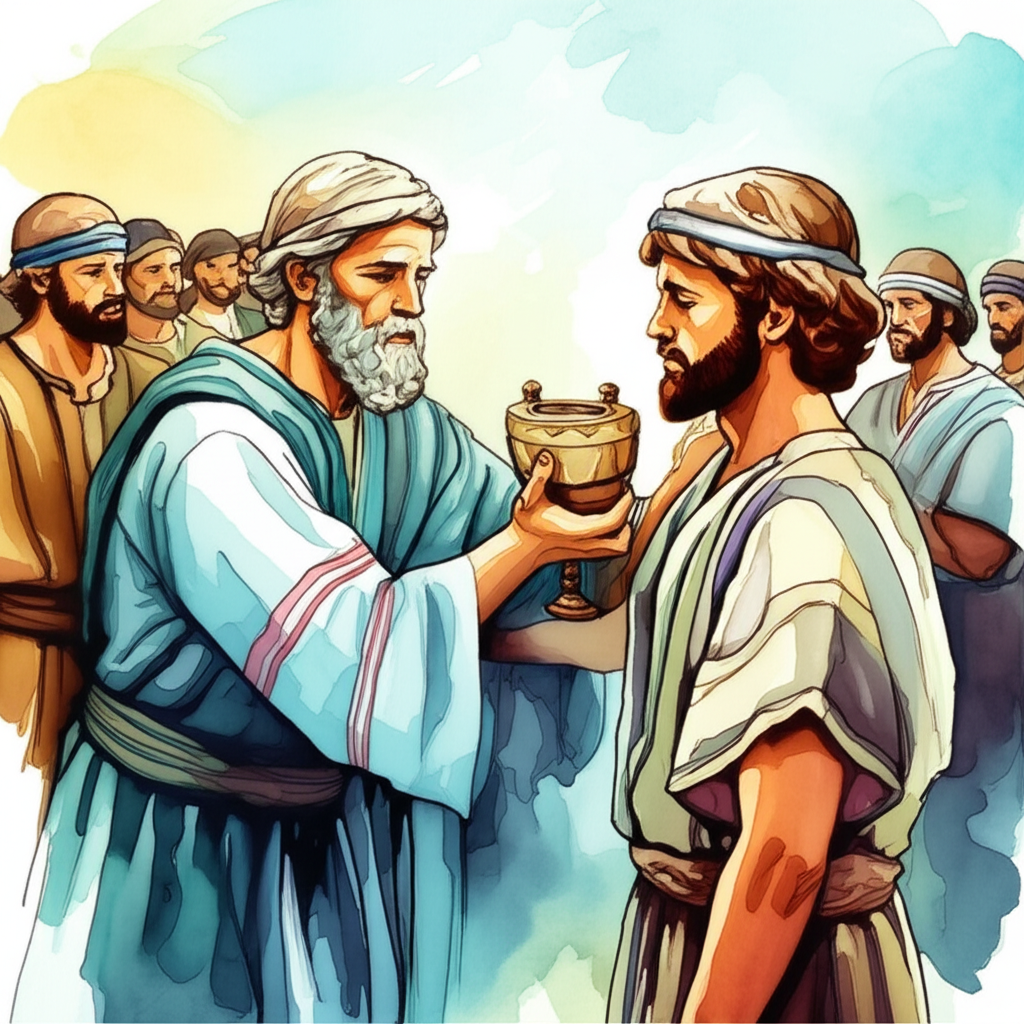


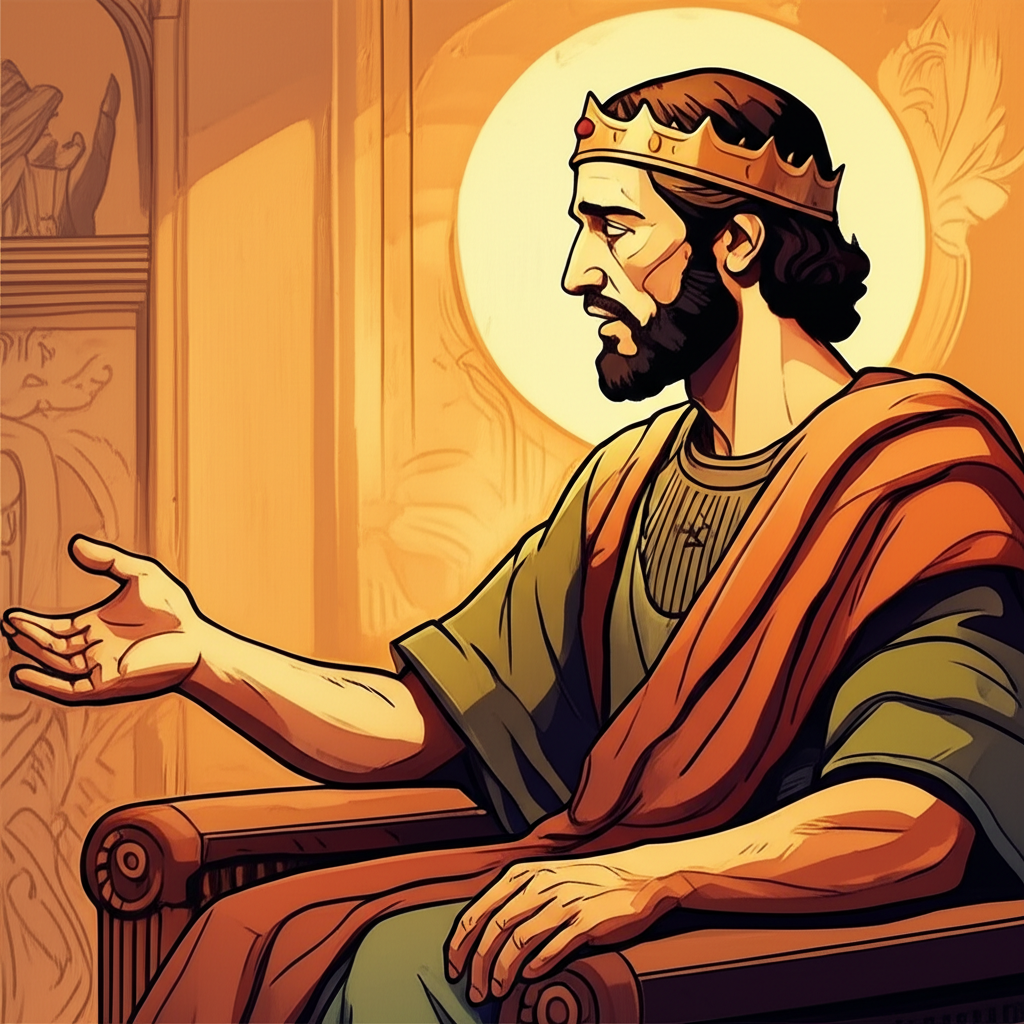
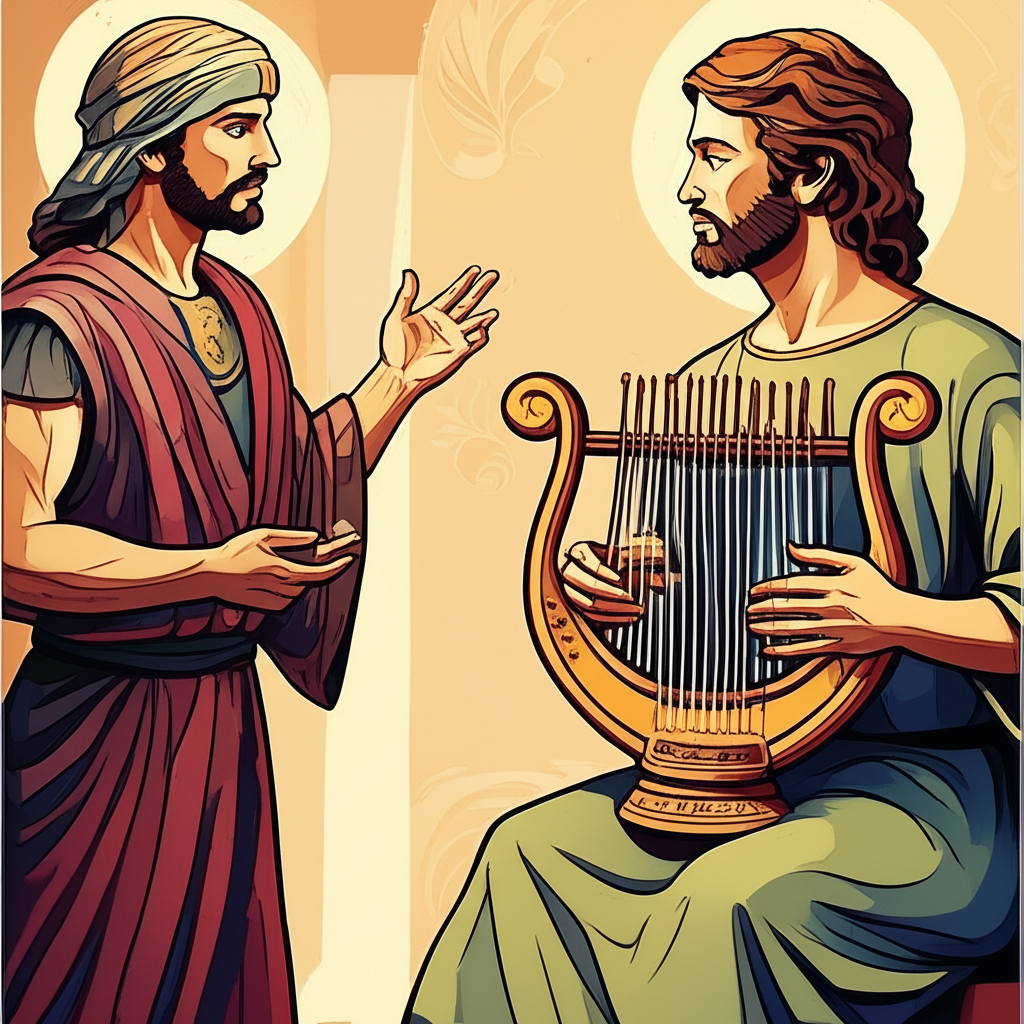
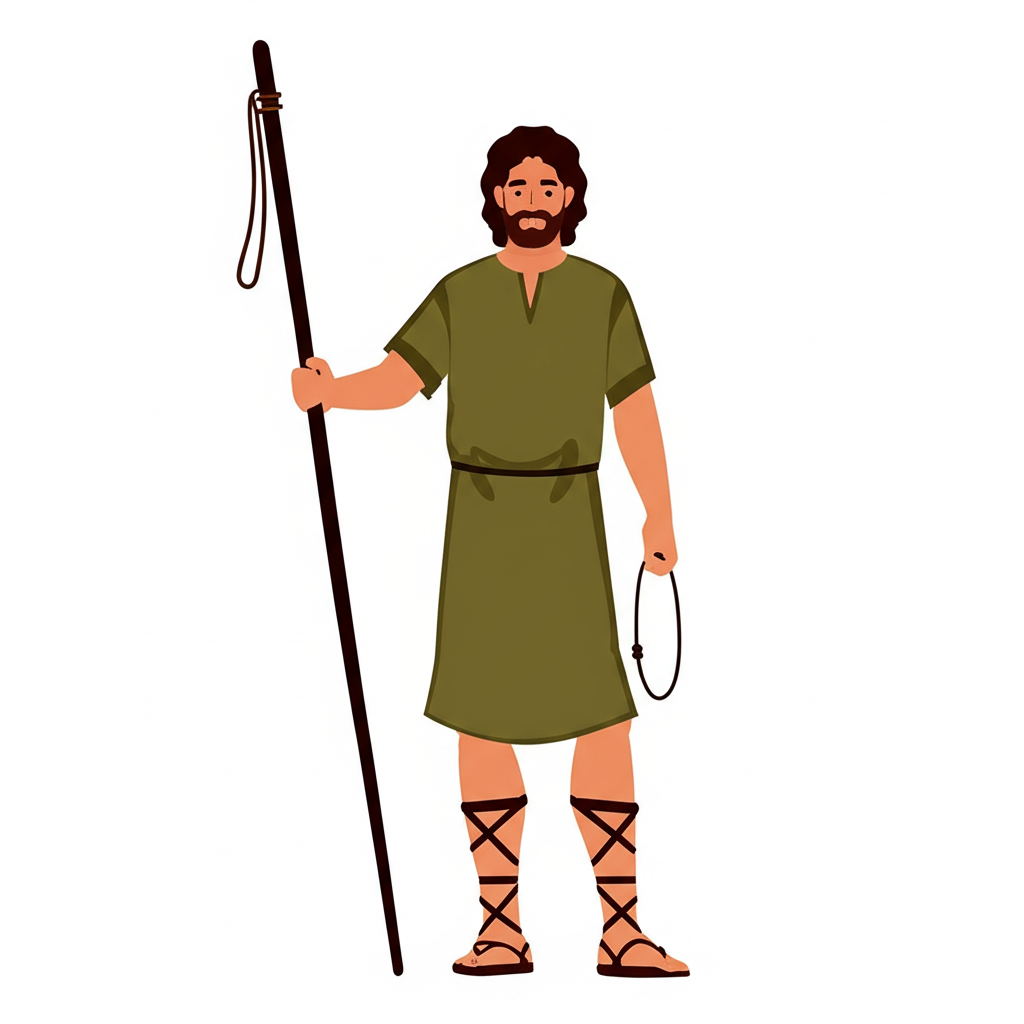
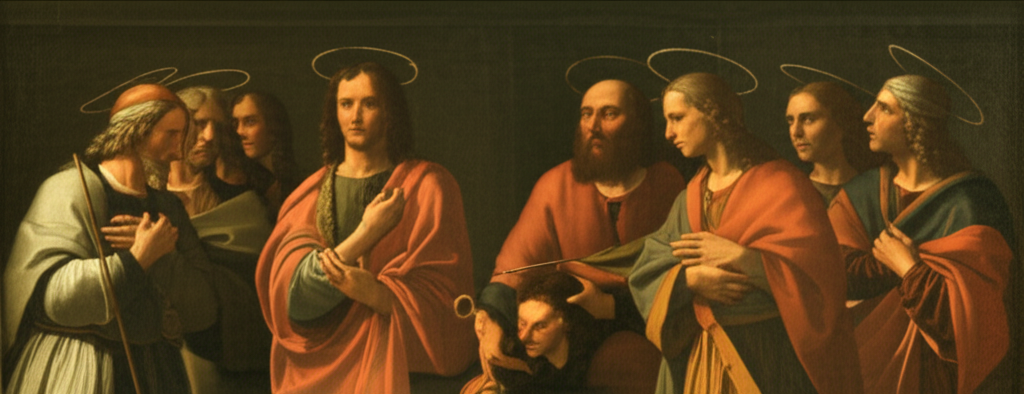
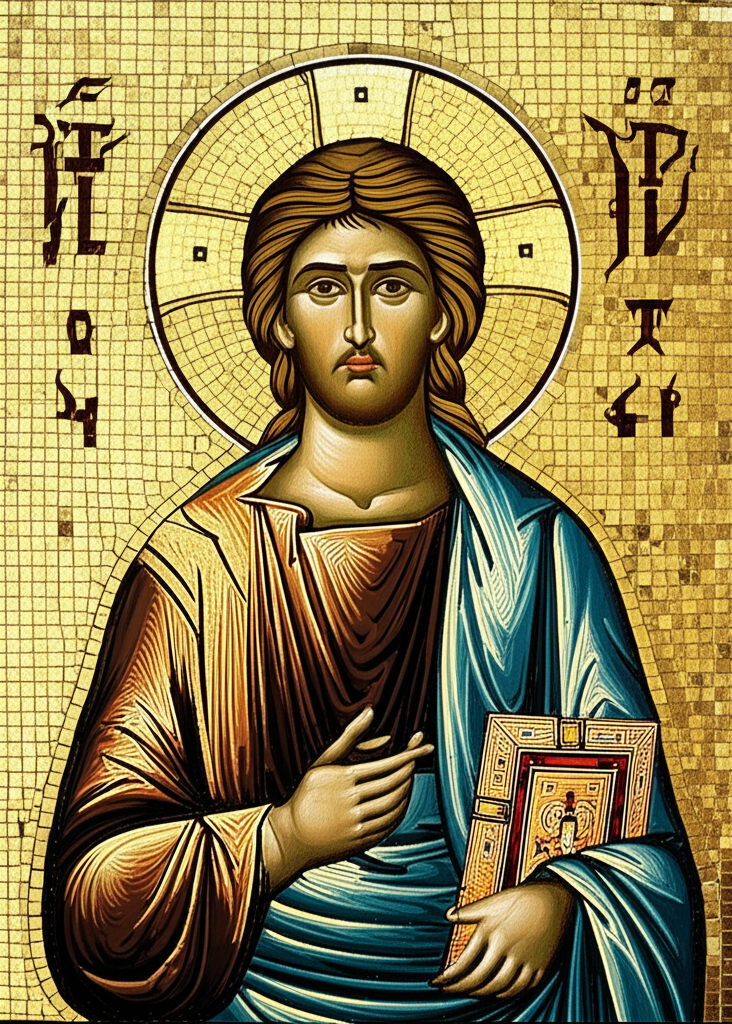

1 Samuel chapter 16 kjv
- 1 And the LORD said unto Samuel, How long wilt thou mourn for Saul, seeing I have rejected him from reigning over Israel? fill thine horn with oil, and go, I will send thee to Jesse the Bethlehemite: for I have provided me a king among his sons.
- 2 And Samuel said, How can I go? if Saul hear it, he will kill me. And the LORD said, Take an heifer with thee, and say, I am come to sacrifice to the LORD.
- 3 And call Jesse to the sacrifice, and I will show thee what thou shalt do: and thou shalt anoint unto me him whom I name unto thee.
- 4 And Samuel did that which the LORD spake, and came to Bethlehem. And the elders of the town trembled at his coming, and said, Comest thou peaceably?
- 5 And he said, Peaceably: I am come to sacrifice unto the LORD: sanctify yourselves, and come with me to the sacrifice. And he sanctified Jesse and his sons, and called them to the sacrifice.
- 6 And it came to pass, when they were come, that he looked on Eliab, and said, Surely the LORD's anointed is before him.
- 7 But the LORD said unto Samuel, Look not on his countenance, or on the height of his stature; because I have refused him: for the LORD seeth not as man seeth; for man looketh on the outward appearance, but the LORD looketh on the heart.
- 8 Then Jesse called Abinadab, and made him pass before Samuel. And he said, Neither hath the LORD chosen this.
- 9 Then Jesse made Shammah to pass by. And he said, Neither hath the LORD chosen this.
- 10 Again, Jesse made seven of his sons to pass before Samuel. And Samuel said unto Jesse, The LORD hath not chosen these.
- 11 And Samuel said unto Jesse, Are here all thy children? And he said, There remaineth yet the youngest, and, behold, he keepeth the sheep. And Samuel said unto Jesse, Send and fetch him: for we will not sit down till he come hither.
- 12 And he sent, and brought him in. Now he was ruddy, and withal of a beautiful countenance, and goodly to look to. And the LORD said, Arise, anoint him: for this is he.
- 13 Then Samuel took the horn of oil, and anointed him in the midst of his brethren: and the Spirit of the LORD came upon David from that day forward. So Samuel rose up, and went to Ramah.
- 14 But the Spirit of the LORD departed from Saul, and an evil spirit from the LORD troubled him.
- 15 And Saul's servants said unto him, Behold now, an evil spirit from God troubleth thee.
- 16 Let our lord now command thy servants, which are before thee, to seek out a man, who is a cunning player on an harp: and it shall come to pass, when the evil spirit from God is upon thee, that he shall play with his hand, and thou shalt be well.
- 17 And Saul said unto his servants, Provide me now a man that can play well, and bring him to me.
- 18 Then answered one of the servants, and said, Behold, I have seen a son of Jesse the Bethlehemite, that is cunning in playing, and a mighty valiant man, and a man of war, and prudent in matters, and a comely person, and the LORD is with him.
- 19 Wherefore Saul sent messengers unto Jesse, and said, Send me David thy son, which is with the sheep.
- 20 And Jesse took an ass laden with bread, and a bottle of wine, and a kid, and sent them by David his son unto Saul.
- 21 And David came to Saul, and stood before him: and he loved him greatly; and he became his armourbearer.
- 22 And Saul sent to Jesse, saying, Let David, I pray thee, stand before me; for he hath found favor in my sight.
- 23 And it came to pass, when the evil spirit from God was upon Saul, that David took an harp, and played with his hand: so Saul was refreshed, and was well, and the evil spirit departed from him.
1 Samuel chapter 16 nkjv
- 1 Now the LORD said to Samuel, "How long will you mourn for Saul, seeing I have rejected him from reigning over Israel? Fill your horn with oil, and go; I am sending you to Jesse the Bethlehemite. For I have provided Myself a king among his sons."
- 2 And Samuel said, "How can I go? If Saul hears it, he will kill me." But the LORD said, "Take a heifer with you, and say, 'I have come to sacrifice to the LORD.'
- 3 Then invite Jesse to the sacrifice, and I will show you what you shall do; you shall anoint for Me the one I name to you."
- 4 So Samuel did what the LORD said, and went to Bethlehem. And the elders of the town trembled at his coming, and said, "Do you come peaceably?"
- 5 And he said, "Peaceably; I have come to sacrifice to the LORD. Sanctify yourselves, and come with me to the sacrifice." Then he consecrated Jesse and his sons, and invited them to the sacrifice.
- 6 So it was, when they came, that he looked at Eliab and said, "Surely the LORD's anointed is before Him!"
- 7 But the LORD said to Samuel, "Do not look at his appearance or at his physical stature, because I have refused him. For the LORD does not see as man sees; for man looks at the outward appearance, but the LORD looks at the heart."
- 8 So Jesse called Abinadab, and made him pass before Samuel. And he said, "Neither has the LORD chosen this one."
- 9 Then Jesse made Shammah pass by. And he said, "Neither has the LORD chosen this one."
- 10 Thus Jesse made seven of his sons pass before Samuel. And Samuel said to Jesse, "The LORD has not chosen these."
- 11 And Samuel said to Jesse, "Are all the young men here?" Then he said, "There remains yet the youngest, and there he is, keeping the sheep." And Samuel said to Jesse, "Send and bring him. For we will not sit down till he comes here."
- 12 So he sent and brought him in. Now he was ruddy, with bright eyes, and good-looking. And the LORD said, "Arise, anoint him; for this is the one!"
- 13 Then Samuel took the horn of oil and anointed him in the midst of his brothers; and the Spirit of the LORD came upon David from that day forward. So Samuel arose and went to Ramah.
- 14 But the Spirit of the LORD departed from Saul, and a distressing spirit from the LORD troubled him.
- 15 And Saul's servants said to him, "Surely, a distressing spirit from God is troubling you.
- 16 Let our master now command your servants, who are before you, to seek out a man who is a skillful player on the harp. And it shall be that he will play it with his hand when the distressing spirit from God is upon you, and you shall be well."
- 17 So Saul said to his servants, "Provide me now a man who can play well, and bring him to me."
- 18 Then one of the servants answered and said, "Look, I have seen a son of Jesse the Bethlehemite, who is skillful in playing, a mighty man of valor, a man of war, prudent in speech, and a handsome person; and the LORD is with him."
- 19 Therefore Saul sent messengers to Jesse, and said, "Send me your son David, who is with the sheep."
- 20 And Jesse took a donkey loaded with bread, a skin of wine, and a young goat, and sent them by his son David to Saul.
- 21 So David came to Saul and stood before him. And he loved him greatly, and he became his armorbearer.
- 22 Then Saul sent to Jesse, saying, "Please let David stand before me, for he has found favor in my sight."
- 23 And so it was, whenever the spirit from God was upon Saul, that David would take a harp and play it with his hand. Then Saul would become refreshed and well, and the distressing spirit would depart from him.
1 Samuel chapter 16 niv
- 1 The LORD said to Samuel, "How long will you mourn for Saul, since I have rejected him as king over Israel? Fill your horn with oil and be on your way; I am sending you to Jesse of Bethlehem. I have chosen one of his sons to be king."
- 2 But Samuel said, "How can I go? If Saul hears about it, he will kill me." The LORD said, "Take a heifer with you and say, 'I have come to sacrifice to the LORD.'
- 3 Invite Jesse to the sacrifice, and I will show you what to do. You are to anoint for me the one I indicate."
- 4 Samuel did what the LORD said. When he arrived at Bethlehem, the elders of the town trembled when they met him. They asked, "Do you come in peace?"
- 5 Samuel replied, "Yes, in peace; I have come to sacrifice to the LORD. Consecrate yourselves and come to the sacrifice with me." Then he consecrated Jesse and his sons and invited them to the sacrifice.
- 6 When they arrived, Samuel saw Eliab and thought, "Surely the LORD's anointed stands here before the LORD."
- 7 But the LORD said to Samuel, "Do not consider his appearance or his height, for I have rejected him. The LORD does not look at the things people look at. People look at the outward appearance, but the LORD looks at the heart."
- 8 Then Jesse called Abinadab and had him pass in front of Samuel. But Samuel said, "The LORD has not chosen this one either."
- 9 Jesse then had Shammah pass by, but Samuel said, "Nor has the LORD chosen this one."
- 10 Jesse had seven of his sons pass before Samuel, but Samuel said to him, "The LORD has not chosen these."
- 11 So he asked Jesse, "Are these all the sons you have?" "There is still the youngest," Jesse answered. "He is tending the sheep." Samuel said, "Send for him; we will not sit down until he arrives."
- 12 So he sent for him and had him brought in. He was glowing with health and had a fine appearance and handsome features. Then the LORD said, "Rise and anoint him; this is the one."
- 13 So Samuel took the horn of oil and anointed him in the presence of his brothers, and from that day on the Spirit of the LORD came powerfully upon David. Samuel then went to Ramah.
- 14 Now the Spirit of the LORD had departed from Saul, and an evil spirit from the LORD tormented him.
- 15 Saul's attendants said to him, "See, an evil spirit from God is tormenting you.
- 16 Let our lord command his servants here to search for someone who can play the lyre. He will play when the evil spirit from God comes on you, and you will feel better."
- 17 So Saul said to his attendants, "Find someone who plays well and bring him to me."
- 18 One of the servants answered, "I have seen a son of Jesse of Bethlehem who knows how to play the lyre. He is a brave man and a warrior. He speaks well and is a fine-looking man. And the LORD is with him."
- 19 Then Saul sent messengers to Jesse and said, "Send me your son David, who is with the sheep."
- 20 So Jesse took a donkey loaded with bread, a skin of wine and a young goat and sent them with his son David to Saul.
- 21 David came to Saul and entered his service. Saul liked him very much, and David became one of his armor-bearers.
- 22 Then Saul sent word to Jesse, saying, "Allow David to remain in my service, for I am pleased with him."
- 23 Whenever the spirit from God came on Saul, David would take up his lyre and play. Then relief would come to Saul; he would feel better, and the evil spirit would leave him.
1 Samuel chapter 16 esv
- 1 The LORD said to Samuel, "How long will you grieve over Saul, since I have rejected him from being king over Israel? Fill your horn with oil, and go. I will send you to Jesse the Bethlehemite, for I have provided for myself a king among his sons."
- 2 And Samuel said, "How can I go? If Saul hears it, he will kill me." And the LORD said, "Take a heifer with you and say, 'I have come to sacrifice to the LORD.'
- 3 And invite Jesse to the sacrifice, and I will show you what you shall do. And you shall anoint for me him whom I declare to you."
- 4 Samuel did what the LORD commanded and came to Bethlehem. The elders of the city came to meet him trembling and said, "Do you come peaceably?"
- 5 And he said, "Peaceably; I have come to sacrifice to the LORD. Consecrate yourselves, and come with me to the sacrifice." And he consecrated Jesse and his sons and invited them to the sacrifice.
- 6 When they came, he looked on Eliab and thought, "Surely the LORD's anointed is before him."
- 7 But the LORD said to Samuel, "Do not look on his appearance or on the height of his stature, because I have rejected him. For the LORD sees not as man sees: man looks on the outward appearance, but the LORD looks on the heart."
- 8 Then Jesse called Abinadab and made him pass before Samuel. And he said, "Neither has the LORD chosen this one."
- 9 Then Jesse made Shammah pass by. And he said, "Neither has the LORD chosen this one."
- 10 And Jesse made seven of his sons pass before Samuel. And Samuel said to Jesse, "The LORD has not chosen these."
- 11 Then Samuel said to Jesse, "Are all your sons here?" And he said, "There remains yet the youngest, but behold, he is keeping the sheep." And Samuel said to Jesse, "Send and get him, for we will not sit down till he comes here."
- 12 And he sent and brought him in. Now he was ruddy and had beautiful eyes and was handsome. And the LORD said, "Arise, anoint him, for this is he."
- 13 Then Samuel took the horn of oil and anointed him in the midst of his brothers. And the Spirit of the LORD rushed upon David from that day forward. And Samuel rose up and went to Ramah.
- 14 Now the Spirit of the LORD departed from Saul, and a harmful spirit from the LORD tormented him.
- 15 And Saul's servants said to him, "Behold now, a harmful spirit from God is tormenting you.
- 16 Let our lord now command your servants who are before you to seek out a man who is skillful in playing the lyre, and when the harmful spirit from God is upon you, he will play it, and you will be well."
- 17 So Saul said to his servants, "Provide for me a man who can play well and bring him to me."
- 18 One of the young men answered, "Behold, I have seen a son of Jesse the Bethlehemite, who is skillful in playing, a man of valor, a man of war, prudent in speech, and a man of good presence, and the LORD is with him."
- 19 Therefore Saul sent messengers to Jesse and said, "Send me David your son, who is with the sheep."
- 20 And Jesse took a donkey laden with bread and a skin of wine and a young goat and sent them by David his son to Saul.
- 21 And David came to Saul and entered his service. And Saul loved him greatly, and he became his armor-bearer.
- 22 And Saul sent to Jesse, saying, "Let David remain in my service, for he has found favor in my sight."
- 23 And whenever the harmful spirit from God was upon Saul, David took the lyre and played it with his hand. So Saul was refreshed and was well, and the harmful spirit departed from him.
1 Samuel chapter 16 nlt
- 1 Now the LORD said to Samuel, "You have mourned long enough for Saul. I have rejected him as king of Israel, so fill your flask with olive oil and go to Bethlehem. Find a man named Jesse who lives there, for I have selected one of his sons to be my king."
- 2 But Samuel asked, "How can I do that? If Saul hears about it, he will kill me." "Take a heifer with you," the LORD replied, "and say that you have come to make a sacrifice to the LORD.
- 3 Invite Jesse to the sacrifice, and I will show you which of his sons to anoint for me."
- 4 So Samuel did as the LORD instructed. When he arrived at Bethlehem, the elders of the town came trembling to meet him. "What's wrong?" they asked. "Do you come in peace?"
- 5 "Yes," Samuel replied. "I have come to sacrifice to the LORD. Purify yourselves and come with me to the sacrifice." Then Samuel performed the purification rite for Jesse and his sons and invited them to the sacrifice, too.
- 6 When they arrived, Samuel took one look at Eliab and thought, "Surely this is the LORD's anointed!"
- 7 But the LORD said to Samuel, "Don't judge by his appearance or height, for I have rejected him. The LORD doesn't see things the way you see them. People judge by outward appearance, but the LORD looks at the heart."
- 8 Then Jesse told his son Abinadab to step forward and walk in front of Samuel. But Samuel said, "This is not the one the LORD has chosen."
- 9 Next Jesse summoned Shimea, but Samuel said, "Neither is this the one the LORD has chosen."
- 10 In the same way all seven of Jesse's sons were presented to Samuel. But Samuel said to Jesse, "The LORD has not chosen any of these."
- 11 Then Samuel asked, "Are these all the sons you have?" "There is still the youngest," Jesse replied. "But he's out in the fields watching the sheep and goats." "Send for him at once," Samuel said. "We will not sit down to eat until he arrives."
- 12 So Jesse sent for him. He was dark and handsome, with beautiful eyes. And the LORD said, "This is the one; anoint him."
- 13 So as David stood there among his brothers, Samuel took the flask of olive oil he had brought and anointed David with the oil. And the Spirit of the LORD came powerfully upon David from that day on. Then Samuel returned to Ramah.
- 14 Now the Spirit of the LORD had left Saul, and the LORD sent a tormenting spirit that filled him with depression and fear.
- 15 Some of Saul's servants said to him, "A tormenting spirit from God is troubling you.
- 16 Let us find a good musician to play the harp whenever the tormenting spirit troubles you. He will play soothing music, and you will soon be well again."
- 17 "All right," Saul said. "Find me someone who plays well, and bring him here."
- 18 One of the servants said to Saul, "One of Jesse's sons from Bethlehem is a talented harp player. Not only that ? he is a brave warrior, a man of war, and has good judgment. He is also a fine-looking young man, and the LORD is with him."
- 19 So Saul sent messengers to Jesse to say, "Send me your son David, the shepherd."
- 20 Jesse responded by sending David to Saul, along with a young goat, a donkey loaded with bread, and a wineskin full of wine.
- 21 So David went to Saul and began serving him. Saul loved David very much, and David became his armor bearer.
- 22 Then Saul sent word to Jesse asking, "Please let David remain in my service, for I am very pleased with him."
- 23 And whenever the tormenting spirit from God troubled Saul, David would play the harp. Then Saul would feel better, and the tormenting spirit would go away.
- Bible Book of 1 Samuel
- 1 Story of Hannah
- 2 Hannah's song and Prayer
- 3 Story of Samuel
- 4 The Philistines Capture the Ark
- 5 The Philistines and the Ark
- 6 The Ark Returned to Israel
- 7 Samuel Judges Israel
- 8 Israel Asks for a King
- 9 Saul the first king of Israel
- 10 Samuel Anoints Saul as King
- 11 Saul Defeats the Ammonites
- 12 Samuel's Farewell Address
- 13 Saul Fights the Philistines
- 14 Story of Jonathan
- 15 Saul and the Amalekites
- 16 David annointed
- 17 David and Goliath story
- 18 David and Jonathan's Friendship
- 19 Saul Tries to Kill David
- 20 Jonathan Warns David
- 21 David and the Holy Bread
- 22 David in the cav of Adullam
- 23 David Saves the City of Keilah
- 24 David Spares Saul's Life
- 25 Death of Samuel and Abigail
- 26 David Spares Saul Again
- 27 David Flees to the Philistines
- 28 Saul consults the Witch of Endor
- 29 The Philistines Reject David
- 30 David's Wives Are Captured
- 31 Death of Saul